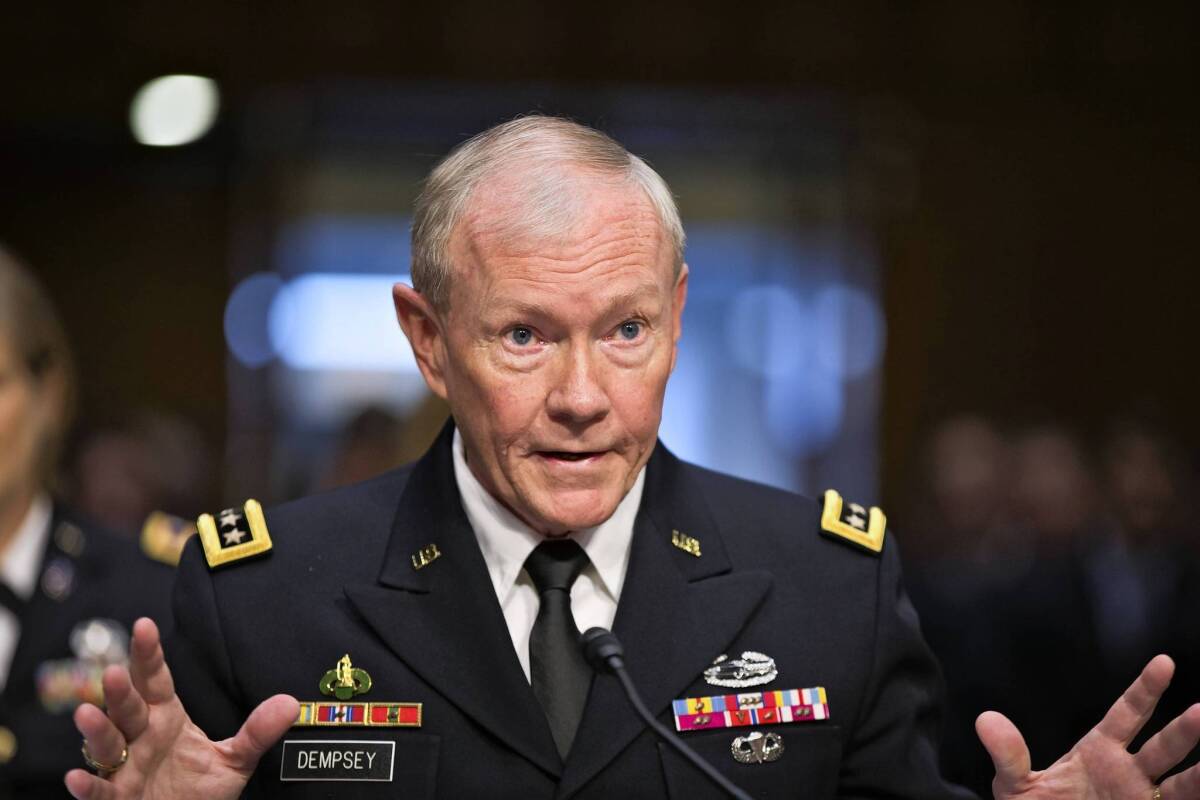McCain may block Gen. Dempsey’s Joint Chiefs reappointment

- Share via
WASHINGTON — The debate over U.S. intervention in Syria threatened to derail the confirmation of America’s top military officer Thursday when a senior Republican senator vowed to block Army Gen. Martin Dempsey’s second-term appointment as chairman of the Joint Chiefs of Staff.
Sen. John McCain (R-Ariz.) will hold up the nomination “until he gets answers to the legitimate questions he asked of Gen. Dempsey on Syria,” McCain spokesman Brian Rogers said after McCain and Dempsey clashed during a confirmation hearing before the Senate Armed Services Committee.
McCain expressed frustration with the general’s testimony regarding the possibility of launching airstrikes to bolster beleaguered rebel forces in the Syrian civil war. The general acknowledged that the Pentagon had drafted plans for “direct kinetic strikes” and that President Obama was weighing the military options. But he refused to offer his personal views, saying the president would make the final decision on use of force.
McCain unsuccessfully pushed the general to give his opinion, asking, “Do you think we ought to see how we could stop the war by intervening and stopping the massacre?”
In a heated exchange, Dempsey said he would “let this committee know what my recommendations are at the appropriate time, yes, sir.”
“The question whether to support it with direct kinetic strikes is … a decision for our elected officials, not for the senior military leader of the nation,” Dempsey said. “That issue is under deliberation inside of our agencies of government, and it would be inappropriate for me to try to influence the decision with me rendering an opinion in public about what kind of force we should use.”
McCain accused Dempsey of shifting his public position on intervention and performing “pirouettes” in his testimony to Congress, a characterization the general rejected.
McCain has long urged the administration to deepen its military involvement in Syria, where more than two years of fighting between security forces and an array of rebel militias have left as many as 100,000 people dead.
It is a view shared by many Syrians who have joined the opposition or fled the fighting.
Secretary of State John F. Kerry got a taste of that anger from Syrian refugees when he visited the Zaatari refugee camp in Jordan on Thursday. He met with a group of camp residents who pleaded for the U.S. to use its air power to create a safe zone for refugees. They contrasted the strong military support that Iran and the Lebanese militant group Hezbollah are giving the Syrian government with what they say is a far weaker effort by the rebels’ foreign supporters.
“Where is the international community? What are you waiting for?” asked a woman, one of six refugees who met with Kerry for 40 minutes in a white trailer on the edge of the barbed-wire-wrapped encampment. “I think the U.S. as a superpower can change the situation in 30 minutes after you return to Washington.”
Kerry listened grimly and said he sympathized. But he said military solutions weren’t as simple as they seemed, and recalled the costs in blood and money that the United States had borne in Iraq and Afghanistan over the last 12 years.
“I wish it was very simple.… It’s not as simple as it sounds,” he said. But he promised, “You are not abandoned.”
The Obama administration said last month that it would provide weapons and ammunition to opposition forces, although the White House has refused to provide details on the precise nature and scope of its military support.
Obama has explicitly ruled out sending ground troops, but administration officials have said that nearly all other military options remain under consideration. The president has also suggested that establishing a no-fly zone would be difficult and ineffective.
In Syria, a Kurdish militia with links to an outlawed group in Turkey was reported Thursday to be in control of a key border crossing along the Turkish-Syrian border as battles raged between its fighters and Syrian Arab rebels.
The renewed violence this week in Ras Ayn, on Syria’s northeastern border with Turkey, has again highlighted the ethnic and sectarian divisions that have come to the forefront during the civil war. A fragile cease-fire between the two groups in the area fell apart this week, resulting in the fierce clashes, according to accounts from Turkish authorities and others. At least two dozen people were killed, according to the Syrian Observatory for Human Rights, a pro-opposition monitoring group based in Britain.
The battles took place in northern Hasaka province, home to Syria’s largest concentration of ethnic Kurds, who are distinct from Arabs, the majority in Syria. Nationwide, Kurds represent about 10% of the Syrian population, according to most estimates.
Most Turkish factions in Syria are secular in nature and say they are opposed to Islamist rule, a fact that has long been a point of friction between Kurdish militiamen and some Syrian Arab rebel factions.
kathleen.hennessey@latimes.com
Hennessey reported from Washington, Richter from Zaatari refugee camp and McDonnell from Beirut. Special correspondent Nabih Bulos in Beirut contributed to this report.
More to Read
Sign up for Essential California
The most important California stories and recommendations in your inbox every morning.
You may occasionally receive promotional content from the Los Angeles Times.














